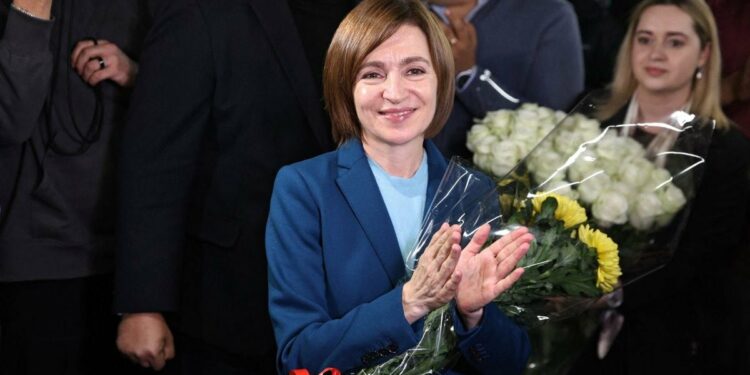Moldova, today you are victorious. Together, we’ve shown the strength of our unity, democracy, and commitment to a dignified future.
Thank you, dear Moldovans, at home and abroad. Walk with pride—you are freedom, hope, and resilience. I am proud to serve you all. pic.twitter.com/yGGlrjAMEC
— Maia Sandu (@sandumaiamd) November 3, 2024
After applying for EU membership in 2022, Sandu has laid out reforms to tackle corruption and bring in investment. Through powerful speeches, she has warned about the difficult yet worthwhile journey ahead for Moldova, a small country of 2.6 million people and one of Europe’s poorest.
The future of Moldova, a low-income agricultural nation balancing between pro-Russian and pro-Western leanings since the Soviet Union’s 1991 dissolution, has drawn attention since Russia began its full-scale invasion of Ukraine in 2022.
This election is not Sandu’s first time claiming that the Kremlin has tried to unseat her. Russia has a long history of seeking influence in Moldova, but Moscow’s pressure intensified following Sandu’s pro-Western election victory in 2020.
In February 2023, Sandu alleged that Russia planned to destabilise Moldova through grassroots protests that would escalate into violence. Although the plot was stopped, she described the situation as “really dramatic.”
The ‘rollercoaster journey’ of Maia Sandu
Born in the village of Risipeni near the Romanian border before Moldova gained independence in 1991, Sandu received a master’s degree in international relations in Chisinau and another in public policy after studying at Harvard University in the United States.
Maia Sandu speaks at a briefing after polling stations closed in the second round of the presidential election, in Chisinau, Moldova, November 3, 2024. Reuters
After a stint in the economy ministry, she worked as an economist at the World Bank’s office in Chisinau for more than seven years and later as an adviser to the body’s executive director in Washington.
In 2012, after two years in Washington, she received an “unexpected” offer from Moldova’s government to return and become the education minister, kicking off what she has described as a “rollercoaster journey” that ended up in her becoming the country’s first woman president.
“The resistance to change, the overwhelming problems in the education sector, the hate speech I was confronted with, all made my life really difficult,” she recalled in a 2022 speech at Harvard University, describing how this built her “resilience”.
In her drive to rid her country of corruption, Sandu founded her own party in 2016, the centre-right Action and Solidarity Party (PAS).
“It took quite some thought and ultimately a leap of faith to go into politics, instead of choosing a different, quiet and comfortable career path,” she said in her speech at Harvard.
She ran for president in 2016 but failed to win. In 2019, she was Moldova’s prime minister before trying for the post of president again in 2020, this time defeating Moscow-backed incumbent Igor Dodon.
‘A huge chance for Moldova’
Landlocked between Ukraine and EU member Romania, Moldova has long been divided over closer ties with the European Union or maintaining Soviet-era relations with Moscow.
Moldova’s presidential candidate Alexandr Stoianoglo speaks at a briefing after polling stations closed in the second round of the presidential election, in Chisinau, Moldova, November 3, 2024. Reuters
When Sandu was elected president, her promises of honesty and competence resonated with many Moldovans following political crises and corruption scandals.
Sandu vowed balanced ties with the West and Russia, but relations with Moscow have increasingly soured since Russia invaded Ukraine, with Sandu accusing Moscow of meddling in her country’s politics.
Fluent in Romanian, English and Russian, Sandu enjoys the “respect and recognition” of international leaders, according to Armand Gosu, a Romanian historian who specialises in former Soviet countries and Russia.
Sandu is “a huge chance for Moldova,” he said, noting she was likely the first Moldovan leader “of such international stature”.
Her critics accuse her of lobbying the West while having failed to manage the country’s struggling economy and high inflation or to push forward judicial reforms.
Sandu has been able “to unite a large base of voters,” but also “a relatively large core of disappointed people”, Florent Parmentier, a political scientist at Paris-based Sciences Po, told AFP.
“The main criticism of her is regarding her ability to listen” to opposing views, he said.
In her speech declaring victory on Sunday, Sandu vowed to be a “president for all”.
“I have heard your voice – both from those who support me and those who voted differently. No matter your voting choice, we all want to live in peace, in harmony, and to have a better life. I assure you that this is my primary goal for the coming years,” she said.
With inputs from AFP
Source link : http://www.bing.com/news/apiclick.aspx?ref=FexRss&aid=&tid=6728586494494c66b0e5b48f3b8c307d&url=https%3A%2F%2Fwww.firstpost.com%2Fexplainers%2Fmaia-sandu-pro-europe-president-second-term-in-moldova-elections-13831610.html&c=17372390660109501231&mkt=de-de
Author :
Publish date : 2024-11-03 21:05:00
Copyright for syndicated content belongs to the linked Source.


